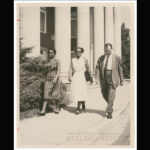Quote:
I’ve got to work. I’m head of a household. I’m feeding children. Even though you ain’t making but $9.35, that $9.35 meant survival. And once we got the union, they felt like, well, I’ve got some protection. I’ve got somebody that really cares.
Source:
Korstad, Robert Rodgers (2003). Civil rights unionism : tobacco workers and the struggle for democracy in the mid-twentieth-century South. Chapel Hill: University of North Carolina Press. p. 217.
Author Bio:
Velma Hopkins (1909-1996) was a Black American worker. The union she co-founded, Local 22, was led primarily by Black women and fought for economic, racial, and gender equality. The year of the citation is an estimate.
Context:
 The multiple discriminations faced by Black workers (as women, Black and workers) often go unrecognised. Unions like Local 22 were formed early in the century as a response to this fact. In 1989, the Black American lawyer Kimberlé Williams Crenshaw coined the term intersectionality. An example of multiple discrimination was the lawsuit brought before white women and Black men by Emma Degraffenreid and four other Black women, who were the first to be fired from a General Motors factory (eds. 1989: "Demarginalising the Intersection of Race and Sex.” University of Chicago Legal Forum, Issue 1, Article 8, pp. 141ff). While race and gender are currently the subject of much discussion, the question of social class is being pushed completely into the background. As early as 2000, after a whole decade of neoliberalism, bell hooks argued that: "Nowadays it is fashionable to talk about race or gender; the uncool subject is class" (bell hooks (2000): Where we Stand: Class Matters, p. vii).
The multiple discriminations faced by Black workers (as women, Black and workers) often go unrecognised. Unions like Local 22 were formed early in the century as a response to this fact. In 1989, the Black American lawyer Kimberlé Williams Crenshaw coined the term intersectionality. An example of multiple discrimination was the lawsuit brought before white women and Black men by Emma Degraffenreid and four other Black women, who were the first to be fired from a General Motors factory (eds. 1989: "Demarginalising the Intersection of Race and Sex.” University of Chicago Legal Forum, Issue 1, Article 8, pp. 141ff). While race and gender are currently the subject of much discussion, the question of social class is being pushed completely into the background. As early as 2000, after a whole decade of neoliberalism, bell hooks argued that: "Nowadays it is fashionable to talk about race or gender; the uncool subject is class" (bell hooks (2000): Where we Stand: Class Matters, p. vii).Further Reading:
*Kimberlé Williams Crenshaw (1989): Demarginalising the Intersection of Race and Sex: A Black Feminist Critique of Antidiscrimination Doctrine, Feminist Theory and Antiracist Politics. University of Chicago Legal Forum. Issue 1, Article 8.
*bell hooks (2000): Where we stand: Class Matters. New York and London: Routledge.
Year:
1944